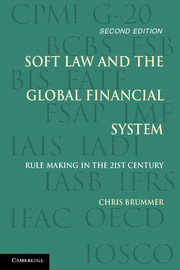Book contents
- Frontmatter
- Contents
- Preface to the New Edition
- Acknowledgments
- Key Abbreviations
- Introduction: The Perils of Global Finance
- 1 Territoriality and Financial Statecraft
- 2 The Architecture of International Financial Law
- 3 A Compliance-Based Theory of International Financial Law
- 4 How Legitimate is International Financial Law?
- 5 Soft Law and the Global Financial Crisis
- 6 Implementing the G-20 Agenda: A Transatlantic Case Survey
- 7 The Future of International Financial Law
- Index
Preface to the New Edition
Published online by Cambridge University Press: 05 November 2015
- Frontmatter
- Contents
- Preface to the New Edition
- Acknowledgments
- Key Abbreviations
- Introduction: The Perils of Global Finance
- 1 Territoriality and Financial Statecraft
- 2 The Architecture of International Financial Law
- 3 A Compliance-Based Theory of International Financial Law
- 4 How Legitimate is International Financial Law?
- 5 Soft Law and the Global Financial Crisis
- 6 Implementing the G-20 Agenda: A Transatlantic Case Survey
- 7 The Future of International Financial Law
- Index
Summary
One of the great rewards of writing the first edition of Soft Law and the Global Financial System was the enormous thanks received from people around the world – from Berlin to Bangladesh – grappling with the rapid changes in the infrastructure in international financial regulation following the 2008 crisis. My objectives were modest: to provide a short theoretical handbook for those of us in the midst of the change, while also giving an overview as to how the new “system” for financial supervision “works.” Since then it has been referred to by regulators, academics and law firm partners to orient their newcomers to the field, as well as to inform more seasoned practitioners as to key developments in the expanding universe of international financial regulation.
But the world changes, as does soft law. Which is, of course, in part the very purpose of informal, flexible rules. But in the seven years since I first embarked upon this project, dramatic changes have inhabited the international financial system and its accompanying regulatory apparatus, indeed even more than I had imagined when the new system was taking shape. Just to name a few:
• The Eurozone crisis that followed the 2008 financial crisis has given birth to a slew of new developments in European financial regulation, including the creation of the EU's Banking Union;
• Both the Dodd-Frank Act (and subsequent SEC and CFTC regulations) as well as dozens EU Directives and Regulations have been largely operationalized to implement G20 commitments
• International standard setters like IOSCO have reorganized the way in which they do business in order to accommodate growing interest and influence from emerging markets;
• The FSB has adopted a more extensive charter outlining its relationship to other international agenda and standard setting bodies; and
• Peer review processes have proliferated at the FSB, IOSCO and, notably, the oldest standard setting body, the Basel Committee.
As these (and many other) changes have taken shape, so has the utility of updating the book to reflect some of the more salient developments. Moreover, certain reforms – and especially EU-US efforts to coordinate regulatory efforts – present an opportunity to not only theorize, but to also evaluate, how theory has worked in practice as regulators ignore, implement, comply and even in some instances “overcomply” with international standards.
- Type
- Chapter
- Information
- Soft Law and the Global Financial SystemRule Making in the 21st Century, pp. vii - viiiPublisher: Cambridge University PressPrint publication year: 2015



